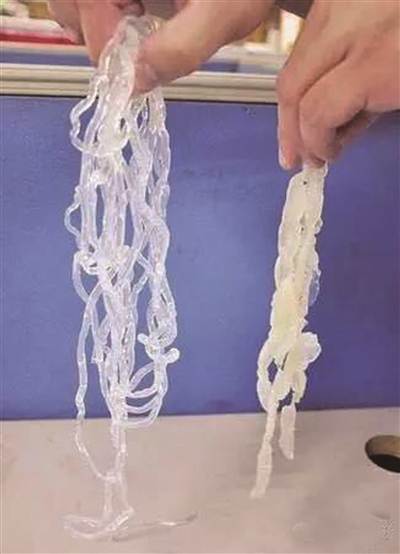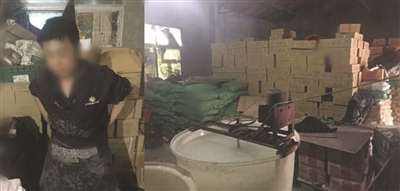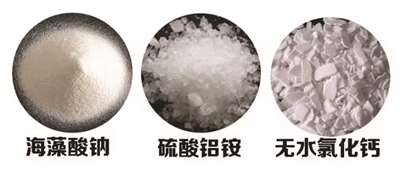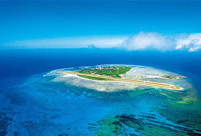


The photo show the fake jellyfish (L) and the real jellyfish (R).
Police in eastern China's Huzhou cracked a case involving fake jellyfish, according to a news report in Hangzhou on May 7.
In late April, police officers at the Huzhou Public Security Bureau received a tip that a man surnamed Yuan and the other two people had been making and selling fake jellyfish at a farmer's market in Huzhou for almost a year.
The police seized more than 150 kilograms of artificial jellyfish at the farmer's market on April 22.
The three suspects started making the fake delicacy with sodium alginate, calcium chloride and aluminum sulfate in June of 2015. Since then, they have made more than 70,000 yuan in profits.
Yuan was aware that the fake jellyfish could be unhealthy or even dangerous . However, the production cost of the artificial jellyfish was less than half the cost of processing real jellyfish. In addition, less time is required to produce artificial jellyfish than is needed to process real ones.
Yuan confessed that he had learned the trade from a "master" surnamed Jia in Changzhou, Jiangsu province.
After hearing Yuan’s confession, the Huzhou police officers went to Changzhou and arrested Jia, along with his two accomplices. The officers also seized 1 ton of fake jellyfish.
Within a year, Jia and his assistants were capable of producing more than 10 tons of fake jellyfish for a profit of more than 100,000 yuan.
An investigation into the whereabouts of the remaining fake jellyfish is underway.

Police officers bust the fake jellyfish production area.

The fake jellyfish are made from sodium alginate, calcium chloride and aluminum sulfate.
 Beijing Style: ready for bare legs
Beijing Style: ready for bare legs Century-old station sees railyway evolution
Century-old station sees railyway evolution Amazing scenery of Xisha Islands
Amazing scenery of Xisha Islands Enthusiasts perform Kung Fu at Wudang Mountain
Enthusiasts perform Kung Fu at Wudang Mountain Stunning photos of China's fighter jets in drill
Stunning photos of China's fighter jets in drill Monk's mummified body to be made into a gold Buddha statue
Monk's mummified body to be made into a gold Buddha statue Asia's longest and highest suspension bridge to open to traffic
Asia's longest and highest suspension bridge to open to traffic China's first interactive robot looks like a beauty
China's first interactive robot looks like a beauty Vietnamese Su-30 fighters fly over Nanwei Island in South China Sea
Vietnamese Su-30 fighters fly over Nanwei Island in South China Sea Top 20 hottest women in the world in 2014
Top 20 hottest women in the world in 2014 Top 10 hardest languages to learn
Top 10 hardest languages to learn 10 Chinese female stars with most beautiful faces
10 Chinese female stars with most beautiful faces China’s Top 10 Unique Bridges, Highways and Roads
China’s Top 10 Unique Bridges, Highways and Roads 7th party congress may send key messages
7th party congress may send key messages  PLA bans commercial activities as anti-graft drive gains momentum
PLA bans commercial activities as anti-graft drive gains momentum  Perfect train track selfies are to die for
Perfect train track selfies are to die for  Prison in the public eye
Prison in the public eye Day|Week